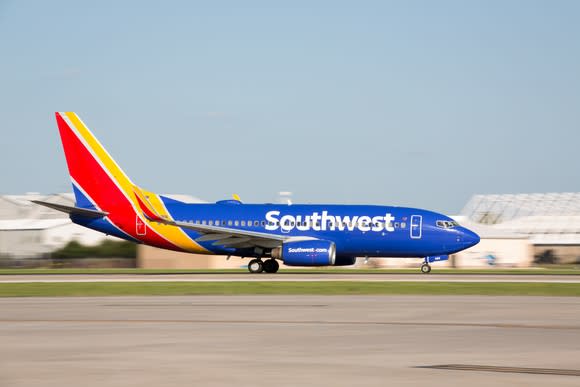Why Did Shares of Southwest Airlines Co. Drop 21% in October?
Sometimes a company can do everything right and its share price still falls. Maybe the market is nervous about the segment it operates in, or perhaps there's a fear that good results today won't translate to similar success in the future.
What happened
Southwest Airlines (NYSE: LUV) had a strong third quarter, reporting record net income of $615 million. It also had record earnings per diluted share of $1.08 for the quarter and returned $591 million to shareholders through share repurchases and dividends.
"The significant increase in our third-quarter 2018 earnings per diluted share was driven by record third-quarter operating revenues, lower federal income taxes, and a 4.8% year-over-year reduction in share count," he said in the Q3 earnings release. "Despite higher jet fuel prices and other cost pressures, we grew our third quarter 2018 net margin, year over year, which is a notable accomplishment."

Southwest set multiple records in Q3. Image source: Southwest Airlines.
So what
Even though Kelly said he expects momentum to continue through the fourth quarter, it's the quick comment about higher fuel prices that may be spooking investors. Airlines, of course, are affected by the price of fuel, but it's not as if they simply pull planes up to the pumps. Kelly explained how that works, at least partially, in his comments.
"Our fuel hedge portfolio mitigated a significant portion of market jet fuel price increases, and we are pleased with the fuel hedge in place for both fourth quarter 2018 and annual 2019," he said. "Based on current trends, we continue to expect modest year-over-year inflation in our annual 2018 unit costs, excluding fuel and oil expense and profit sharing expense."
That should have mollified investors, but it doesn't appear to have. After closing September at $62.45, shares in Southwest fell to $49.10, down 21%, according to data from S&P Global Market Intelligence.
Now what
It's all about performance. There's no logical reason for this dip. It reflects fears over how the market might develop, not how the company actually operates.
Higher fuel prices could force Southwest to raise prices, though the same thing would affect the rest of the industry. If prices went high enough, it could cost the low-price airline business, as some of its customers would probably travel less, but that doesn't seem like a major concern for the company over the next quarter and the following year.
More From The Motley Fool
Daniel B. Kline has no position in any of the stocks mentioned. The Motley Fool owns shares of and recommends Southwest Airlines. The Motley Fool has a disclosure policy.
